
By Steve Sailer
02/13/2020
From The New York Times news section:
As Egypt’s Population Hits 100 Million, Celebration Is Muted
With little habitable land, deepening poverty and dwindling supplies of water, the future looks bleak. And there is no sign of a slowdown.
By Declan Walsh
Feb. 11, 2020… If unchecked, the population could reach 128 million by 2030, officials say.
Mr. el-Sisi tried to push back the tide with a public health campaign called “Two Is Enough” to persuade parents to have fewer children. Like many such efforts, it failed.
Fertility rates have risen since 2008, to 3.5 children per woman, according to the United Nations, and the population is growing 1.8 percent annually — a rate that, in Egypt’s crowded cities and towns, adds one million citizens every six months….
Egypt’s population crisis is amplified by its unforgiving geography: 95 percent of the population lives on about 4 percent of the land, a green belt roughly half the size of Ireland that follows the Nile as it snakes through the desert then fans out into the lush Nile Delta.
… During the 1990s and 2000s, rates fell to 3.0 from 5.2, according to government figures.
But the rate rose again around the time of the Arab Spring in 2011, for reasons that are not entirely clear, but probably stem from economic disruption, government turmoil and a drop in birth control funding from Western governments. …
Other large developing countries with soaring populations have managed to get the problem under control. Vietnam, where the population grew to 97 million in 2018 from 60 million in 1986, has reduced the rate of increase to 1 percent. Bangladesh, which has a population of more than 160 million, has done the same.
In Egypt, though, the rate of growth is nearly twice as high, at 1.79 percent in 2018-19.
In general, the world path for fertility is down down down. A major problem of the 22nd Century might be to turn that around.
But in this century rapid population growth is still a problem in some countries, even as the problem is being solved in other, seemingly similar countries. E.g., terribly overpopulated Islamic Bangladesh has made a lot of progress, but Pakistan less so.
This is a content archive of VDARE.com, which Letitia James forced off of the Internet using lawfare.